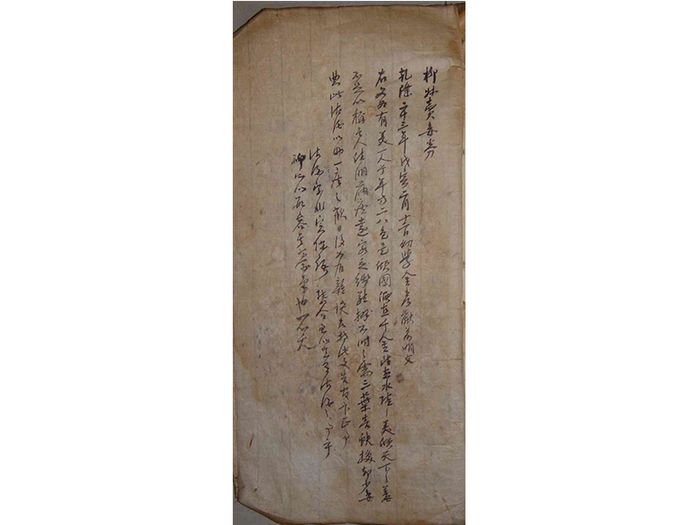(Translation) 1758年 賣妾文券
| Primary Source | ||
|---|---|---|
 |
Title | |
| English | A Document of Selling a Concubine | |
| Chinese | 1758年 賣妾文券 | |
| Korean(RR) | 1758년 매첩문권 | |
| Text Details | ||
| Genre | Old Documents (文書) | |
| Type | Record | |
| Author(s) | 李之栢 | |
| Year | 1758 | |
| Source | ||
| Key Concepts | ||
| Translation Info | ||
| Translator(s) | Participants of 2017 Summer Hanmun Workshop (Advanced Translation Group) | |
| Editor(s) | ||
| Year | 2017 | |
목차
- 1 Introduction
- 2 Original Script
- 3 Discussion Questions
- 4 Further Readings
- 5 References
- 6 Translation
- 6.1 Student 1 : (Write your name)
- 6.2 Student 2 : (Write your name)
- 6.3 Student 3 : (Write your name)
- 6.4 Student 4 : (Write your name)
- 6.5 Student 5 : (Write your name)
- 6.6 Student 6 : (Write your name)
- 6.7 Student 7 : (Write your name)
- 6.8 Student 8 : (Write your name)
- 6.9 Student 9 : (Write your name)
- 6.10 Student 10 : (Write your name)
- 6.11 Student 11 : (Write your name)
- 6.12 Student 12 : (Write your name)
- 6.13 Student 13 : (Write your name)
- 6.14 Student 14 : (Write your name)
- 7 Further Readings
Introduction
Introduction by Youngsuk Park
This piece of literature was written in 1758 by Yi Chibaek (李之栢), the nephew of Yu Kyŏng-ha (柳經河), who was the great-grandson of the renowned Confucian scholar Yu Sŏng-ryong (柳成龍, 1542-1607). The date testifies that it was the time when King Yŏngjo's yunŭm, the Prohibition of Wine Drinking (1756) was still widely heard. The king directly warned people that wine drinking was such the insidious evil, as it could bring the whole nation down.[1] Nonetheless wine drinking violation was prevalent at that time and obviously associated with lasciviousness. Drinking, as King Yŏngjo feared, could cause a proud and esteemed scholar to fall into vulgarity. Reflecting the social milieu of the time, this document in a form of legal text is but filled with farcical exaggerations, such as, sixteen-year old[2], the unparalleled beauty on heaven and earth[3], selling a concubine[4], the sickly old man from afar[5], and selling the beauty in a cheap price for a drink. Judged by these unrealistic and contrasting expressions, and notwithstanding the word 一笑 (one laugh) at the end, this text should be classified as a piece of satire rather than a legal document. It is written by the younger scholar who observes the older generation with mockery and sarcasm.
Original Script
| Classical Chinese | English |
|---|---|
|
乾隆二十三年戊寅二月十二日幼學金彦猷前明文 右文爲有美一人兮 年方二八 色是傾國 價直千金 雖盡水陸之美 傾天下之羞 不足以稱其人佳麗 病疲遠客 乏錢難辧不時之需 三葉壹蚨 換却少妾 典此沽酒 以助一座之歡 日後如有雜談者 持此文 告官卞正事 酒字非實際語 禁令至嚴 豈有沽酒之事乎 聊所以形容其齊家(務)也 一笑 |
( By Zhijun Ren The 23rd year of Qianlong, second month, twelfth day, the document to the degreeless scholar Kim Eonyu As to what this document pertains, I have a beautiful girl Her age is merely sixteen, her beauty is such as to topple a country and worth ten thousand taels of gold. Her gorgeousness could not be adequately described even when exhausting the lavish praise from land and sea, and giving all the words of admiration under heaven. I have drifted from afar and now tired and ill. Lacking money, I could not meet the unexpected emergent need. (I am willing) to exchange my young concubine with a small amount of money. Sell her to buy liquor, to liven up the spirits of the party. Should there be a dispute at a later date, take this document and report to the authorities for justice to this matter. “Buying liquor” is not a serious and factual statement. With such a strict prohibition, how could anyone buy liquor? This is only meant to manifest her value, just for laugh. ) |
Discussion Questions
Further Readings
References
- ↑ Refer to 御製戒酒綸音 (King Yŏngjo's Prohibition of Wine Drinking).
- ↑ Age sixteen is typically spoken as the prime time for a woman.
- ↑ This exaggeration matches the farcical 'selling concubine' rhetoric.
- ↑ Selling one's concubine was not and could not be practiced in the Confucian Chosŏn society. According to Dr. An Seungjun no such a legal paper of selling one's concubine was ever found in Korea (Spoken on July 19, 2017).
- ↑ For the purpose of making a satire, this description of a man stands to sharply contrast against the beauty.
Translation
Student 1 : (Write your name)
- Discussion Questions:
Student 2 : (Write your name)
- Discussion Questions:
Student 3 : (Write your name)
- Discussion Questions:
Student 4 : (Write your name)
- Discussion Questions:
Student 5 : (Write your name)
- Discussion Questions:
Student 6 : (Write your name)
- Discussion Questions:
Student 7 : (Write your name)
- Discussion Questions:
Student 8 : (Write your name)
- Discussion Questions:
Student 9 : (Write your name)
- Discussion Questions:
Student 10 : (Write your name)
- Discussion Questions:
Student 11 : (Write your name)
- Discussion Questions:
Student 12 : (Write your name)
- Discussion Questions:
Student 13 : (Write your name)
- Discussion Questions:
Student 14 : (Write your name)
- Discussion Questions:
